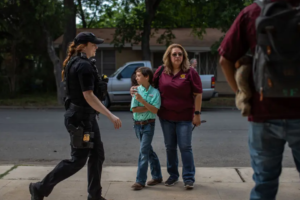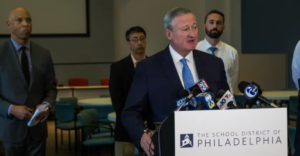Leah Porter didn’t expect to become a kindergarten teacher, but 16 years later she was honored as one of the best – becoming Michigan’s Teacher of the Year.
“It’s a lot to wrap my head around,” said Porter, who transitioned this year to teaching third grade at Wilcox Elementary School in Holt. Even the nomination took her aback.
Porter might be the only one surprised that among the state’s 275 nominees, she came out on top, said Holt Superintendent David Hornak.
“What makes Leah special is she has a passion for supporting the underrepresented and going the extra mile to make a difference each day,” Hornak said.
As Michigan’s Teacher of the Year, she’ll meet with and speak to lawmakers and others shaping education policy. She now serves as a non-voting member of the state Board of Education and is a contender for the National Teacher of the Year award.
You taught kindergarten for 15 years, almost your whole career. Why kindergarten?
I really wanted to teach fifth grade, but there was a teacher surplus in 2005. I went a year without a teaching job, and then the next summer I taught summer school for Holt and met Principal Tracy Heuhs. She wanted to hire me for the school year, but there was only one position open at Wilcox: kindergarten.
It was terrifying because it was so far away from what I thought I wanted to do, teaching those littlest learners is such a great responsibility, and one I unexpectedly fell in love with. It’s about helping kids foster a love of learning, hooking them into literature, building relationships with families, and really wanting to set them on a trajectory for success.
So, why the switch to third grade?
I wanted the challenge of a new grade, and felt I could support students that continued to struggle as readers. The rigor of the curriculum in third grade increases tremendously, and I wanted to help support students in that transition.
It’s a chance to help kids see themselves as learners. Kids walk in the first couple days and say, “I’m not good at reading,” or “I can’t read,” and I show them they can. They don’t see themselves as being able to do it, and they need that vision for themselves to build efficacy for themselves.
Last year, did you teach mostly in person or mostly virtually? And how was that for you?
We were remote until the middle of March. After that, I had part of my class in person and I was still teaching the rest of the class remotely. It was eye-opening.
I had always been good at building relationships with families but in the situation with remote learning the parents and I had to be co-partners on the learning journey.
I felt like I knew kids like I never knew them before. I was in their houses, I got to see their bedrooms, I got to see their backyards, I got to know siblings when they would help them with something, I got to know their family routines. I knew so many pieces of their lives that I never would have known. There was so much beauty and so much hardship last year. From knowing families deeply, I worked hard to show empathy and understanding for the experiences and provide supports as needed.
How are your students adjusting to being back in school?
Academically, the challenges are great but I see that kids are working so hard to readjust. Kids left in the middle of first grade and returned as third graders. That’s a huge transition. Think about the learning they might have missed, the learning they weren’t engaged in, and now all the rigor coming from their grade level this year.
Are you doing anything differently this year to account for what so many families have been going through?
My co-teacher, Lynne Cobb, and I have been really thoughtful and mindful about making sure students feel a sense of community and that we’re in this together.
We have all of our faces on magnets and we do a morning meeting each day. If someone is missing, we move them into a heart at the center of the board so even if they’re not with us we’re thinking of them and wishing them well. Since we’re a mask-mandated school it’s nice to have the pictures of our actual (unmasked) faces as well.
We’ve also been working on calming skills. We do a lot of breaking exercises as part of our morning meeting and we do connection activities where kids will engage each day around a commitment statement about what we’re going to achieve that day, sometimes as a class and sometimes individually.
We’re taking the time for kids to know that we see them, that we know they’re humans. In the classroom we get bogged down in everything we have to do and we sometimes forget to take that pause and see each child as a human being.
Being Teacher of the Year gives you a platform. How will you use it?
I’m seeing such inequity in opportunities for kids, particularly children of color. I’m focused on equity in terms of how we’re going to elevate all of our students. That’s what’s on the forefront of all the work I’m doing.
I’ve been working on building character and leadership lessons that use a library of texts that are representative of all the students. Are kids seeing themselves in the books we’re reading? Are we representing all of our students?
Who was your most influential teacher?
I found my second grade teacher at North Elementary in Lansing to be magical. She had a calm demeanor that elevated you and made you feel like you were really seen by her. Her impact on me continued long after I was out of her classroom.
In third grade my uncle was sent to Iraq to fight in the Persian Gulf War.. The night the war started my mom picked up the phone, and it was Mrs. Henderson calling to check on us because she knew my uncle was there. I wasn’t even in her class anymore.
It was the first time I had this realization that the impact of a teacher wasn’t just within the walls of a school, the first time I understood that it wasn’t just about the education. It was about connecting with the people that were in front of you and really seeing them.
This article was originally posted on Empathy and equity are key to Michigan Teacher of the Year’s success






Be First to Comment